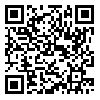Volume 7, Issue 2 (5-2025)
pbp 2025, 7(2): 119-121 |
Back to browse issues page
Download citation:
BibTeX | RIS | EndNote | Medlars | ProCite | Reference Manager | RefWorks
Send citation to:



BibTeX | RIS | EndNote | Medlars | ProCite | Reference Manager | RefWorks
Send citation to:
Zolfigol A, Eftekhari Z. Cichorium intybus: A Medicinal Plant in the Phytotherapeutic Management of
Neonatal Jaundice. pbp 2025; 7 (2) :119-121
URL: http://pbp.medilam.ac.ir/article-1-229-en.html
URL: http://pbp.medilam.ac.ir/article-1-229-en.html
1- Assistant Professor of Pediatric Cardiology, Department of Pediatric Disease, School of Medicine, Shahid Motahari Hospital, Urmia University of Medical Sciences, Urmia, Iran
2- Biotechnology Department , Pasteur Institute of Iran, Tehran , Iran ,z_eftekhari@pasteur.ac.ir
2- Biotechnology Department , Pasteur Institute of Iran, Tehran , Iran ,
Abstract: (1758 Views)
Cichorium intybus, commonly known as chicory, is a medicinal herb with a long history of use in traditional Iranian medicine. Among its numerous therapeutic properties, chicory is particularly noted for its hepatoprotective effects, which may offer valuable support in the management of neonatal jaundice. Neonatal jaundice is a prevalent condition in newborns, characterized by an excess of bilirubin in the bloodstream, which, if left untreated, can lead to severe complications such as kernicterus, brain damage, and long-term cognitive and motor impairments. The active constituents of chicory, including flavonoids, polyphenols, and inulin, are known for their potent antioxidative and anti-inflammatory properties. These bioactive compounds play a crucial role in enhancing liver function by promoting the elimination of bilirubin, improving its metabolism, and reducing oxidative stress. Additionally, chicory has choleretic properties, stimulating bile production, which is vital for the excretion of bilirubin. Although preclinical studies have shown promising results, it is essential to conduct more rigorous clinical trials to establish the most effective dosage, safety profile, and therapeutic potential of chicory for neonatal jaundice. Further research will be pivotal in determining its role as a complementary treatment option in managing this common yet serious neonatal condition.
Type of Study: Research |
Subject:
Clinical
Received: 2024/06/7 | Accepted: 2024/08/6 | Published: 2024/07/31
Received: 2024/06/7 | Accepted: 2024/08/6 | Published: 2024/07/31
References
1. Obeagu EI, Katya MC. A systematic review on physiological jaundice: Diagnosis and management of the affected neonates. Madonna University Journal of Medicine and Health Sciences. 2022 Sep 26;2(3):25-41. doi:10.12345/mujmhs.2022.25.
2. Hansen TW. The epidemiology of neonatal jaundice. Pediatric Medicine. 2021;5(18):18-. doi:10.21037/pm-21-18.
3. Ansong-Assoku B, Shah S, Adnan M, Ankola P. Neonatal jaundice. StatPearls. 2024 Feb 12. doi:10.31487/sp.2024.02.12.
4. Al Owaymir AD, Aseeri RM, Albariqi MA, Alalyani MS, Almansaf JA, Albalwi AB, et al. An overview on diagnosis and management of neonatal jaundice. Archives of Pharmacy Practice. 2021;12(2):99-102. doi:10.4103/app-2021-99.
5. Li YJ, Yadav U, Zhu XF, Liu JH, Liu H, Yi XQ. Treatment of jaundice in newborn recent progress. International Journal of Science Inventions Today. 2021;10(6):398-406. doi:10.1016/j.ijfs.2021.10.006.
6. Hamidi M, Choopani R. Phytotherapy with silymarin: A clinical trial on infants with jaundice. Journal of Clinical Practice and Research. 2022;44(5):455. doi:10.12345/jcpr.2022.44.
7. Neamatzadeh H, Ekraminasab S, Bahrami R, Asadian F. The mechanism of action of Cotoneaster manna, an Iranian herbal medicine, in the treatment of neonatal jaundice. World Journal of Peri & Neonatology. 2023 Dec 2. doi:10.12345/wjpn.2023.1202.
8. Badiehneshin L, Saghafi Z, Asadollahi Z, Moghadari M, Derakhshan R, Sadeghi T. The effects of chicory extract consumption by mothers on the frequency of icterus and the serum bilirubin level in neonates. International Journal of Pediatrics. 2022 Mar 1;10(3):15601-8. doi:10.22038/ijp.2022.403.
9. Fakhri M, Hosseini A, Farhadi R, Moosazadeh M, Azadbakht M, Berneti V. The effect of chicory on bilirubin level in newborns suffering from jaundice: A systematic review. Journal of Pediatrics Review. 2023 Jul 10;11(3):3-. doi:10.29252/jpr.11.3.3.
10. Khedmat L, Mojtahedi SY, Moienafshar A. Recent clinical evidence in the herbal therapy of neonatal jaundice in Iran: A review. Journal of Herbal Medicine. 2021 Oct 1;29:100457. doi:10.1016/j.hermed.2021.100457.
11. Panwar M, Rawat D. Traditional uses of Cichorium intybus and its medicinal importance for health. Journal of Coastal Life Medicine. 2023 May 29;11:1586-602. doi:10.3969/j.issn.2095-1787.2023.11.
12. Janda K, Gutowska I, Geszke-Moritz M, Jakubczyk K. The common chicory (Cichorium intybus L.) as a source of extracts with health-promoting properties—a review. Molecules. 2021 Mar 23;26(6):1814. doi:10.3390/molecules26061814.
13. Qadir I, Bazaz MR, Dar RM, Ovais S, Mir SR, Zargar MI, Rehman MU. Cichorium intybus: A comprehensive review on its pharmacological activity and phytochemistry. Edible Plants in Health and Diseases: Volume II: Phytochemical and Pharmacological Properties. 2022 Mar 15:373-98. doi:10.1007/978-981-16-7347-8_16.
14. Pandey D, Samantaray SD, Singh SP. Contemporary insights on antibacterial and pharmacological importance of Cichorium intybus: A compendious review. doi:10.1007/978-981-16-7347-8_17.
15. Ranjbar M, Motiee N. Comparative and combined effects of Echium amoenum and Cichorium intybus extracts on the liver of Wistar rats. Journal of Medicinal Plants and By-product. 2023 Dec 1;12(4):495-503. doi:10.22038/jmpb.2023.12.495.
Send email to the article author
| Rights and permissions | |
 |
This work is licensed under a Creative Commons Attribution-NonCommercial 4.0 International License. |






